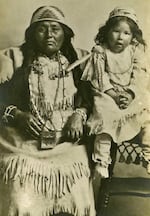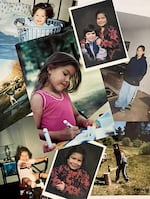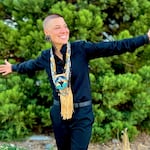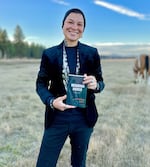
Shuína Skó works to "empower Indigenous people, create avenues for positive societal change, and share the vibrancy of their culture through storytelling."
provided photo / Underscore Native News
This story originally appeared on Underscore Native News.
Editor’s note: Support for this reporting came from the Poynter Institute with funds from the Gill Foundation. Read other stories in this series here and here.
Shuína Skó wrote their first poem in third grade, exploring themes of hope and imagination. More than two decades later, their words continue examining those same themes, only now on a global scale.
As a Two-Spirit spoken word poet, storyteller, Indigenous rights activist, internationally recognized self-published author, and U.S. Navy veteran, Shuína Skó is committed to uplifting and celebrating the Indigenous LGBTQIA2S+ experience. They believe in the power and necessity of authentic representation — of Indigenous voices telling their own stories.
“When we tell our own stories and when we share our experience and when we increase our reach throughout our Native communities and non-Native communities, that’s when we’ll start seeing greater positive impact and a reduction in social issues within our communities,” Shuína Skó, a citizen of the Klamath Tribes and of Little Shell Chippewa descent, said. “More of us will be seen, and more of us will be able to be guided in a good way.”
The name Shuína Skó translates to “Singing Spring” in Ewksiknii, or Klamath language, and was given to them by elders when they were 3 years old. Their English name is Kayce Womack, but they choose to use their traditional name as a way to honor their ancestors. Though they go by all pronouns, they prefer to be called Shuína Skó because gendered pronouns weren’t used in Klamath culture; instead, people referred to themselves and others by their names.

Shuína Skó’s great-great grandmother and her daughter.
provided photo / Underscore Native News
Shuína Skó resides on their maternal homelands of the Marsh people of Klamath Tribes in present-day Southern Oregon. Their great-great-great-great-grandfather, Chinchallo MukHas, was an original signer of the 1864 treaty between the Klamath and federal government.
“[Shuína Skó] is such a light for our tribe and for exposing non-tribal people to cultural values,” Shuína Skó’s mother and Klamath elder, Camille DeLorme, said. “She does that through her poetry, and not just her poetry that reflects who she is as a person, but her personhood has such an impact on those that she’s around.”
Shuína Skó, 36, attributes much of their authenticity to their mother, who instilled the value of showing up as one’s true self from a young age.
“We talk a lot about authenticity and being genuine as a Native value, and I think a lot of the non-Native world has opened their eyes to that value lately. But I think when you see Shuína Skó, that’s what you get,” DeLorme said. “[Shuína Skó] is not afraid to be vulnerable and to expose herself, and she does that in her writing, in her poetry and in her daily life. So she’s truly genuine and I think it’s rare.”
‘We’re a matriarchal people’
When Shuína Skó was growing up, they were raised in a Klamath household with their mom, younger brother and stepfather. They said they were unaware of power dynamics between men and women when it came to gendered roles and sexual orientation, because they were raised in a matriarchal society where everyone was expected to be strong leaders.
“We’re a matriarchal people,” Shuína Skó said. “We were then; we are now.”

Shuína Skó as a child with their mother.
provided photo / Underscore Native News
“Initially, boys and girls, men and women, we were all the same,” Shuína Skó added. “All of the females or women, we’re expected to be just as strong and just as good leaders, if not more than the men in our lives. So with that viewpoint, naturally, I grew up as a tomboy knowing that I can kind of excel in whatever I do, regardless of my gender and sexuality.”
Shuína Skó expands on what a traditional matriarchal society looks like in their book, “SHE IS MATRIARCH: Poetry for the Indigenous Feminine Spirit”:
“Traditionally the ewksiknii flourished as a matriarchal society. Women were viewed as leaders then and continue to lead now … At home westernized views of what a girl should act like were not imposed onto me. This allowed me to feel empowered during my transition into adulthood.”

Pictures of Shuína Skó from their childhood.
provided photo / Underscore Native News
Shuína Skó’s mother said that since she raised her children with this mindset, she knew her kids could succeed in whatever they set their minds to. DeLorme was impressed when, shortly after high school, Shuína Skó joined the U.S. Navy as a Seabee and pursued construction and engineering.
“I was proud that [Shuína Skó] chose to pursue nontraditional female roles and excelled in them,” DeLorme said.
‘Don’t Ask, Don’t Tell’
Shuína Skó remembers from childhood having an aunt and other family members who were queer, but they said no one ever outwardly expressed it because to them “it was never important.”
“It wasn’t suppressed or oppressed,” Shuína Skó added.
That changed when they started getting older and attended middle and high school outside of the Native community.
Shuína Skó said they were already at a higher risk of harm as a Native person navigating a non-Native environment and had to consider the version of themself they wanted to present that was the most acceptable and safe.
“When I saw people get bullied for their sexuality, then I chose to hide mine,” they said. “And same thing when I saw females get treated better for being feminine, I chose to become more feminine, to become more safe.”

Shuína Skó enlisted in the U.S. Navy in 2006.
provided photo / Underscore Native News
Hiding their Two-Spirit identity was a burden of survival that many queer people share. But by taking extra precautions, Shuína Skó ensured their protection and safety through high school and into early adulthood.
Shuína Skó enlisted into the Navy in 2006. This was during the Don’t Ask, Don’t Tell (DADT) era, pushing them back into the closet once again to protect their safety.
The DADT policy, enacted in 1994, prohibited qualified gay, lesbian and bisexual Americans from serving in the armed forces for more than two decades, sending a message to the LGBTQIA2S+ community and greater public that homophobic discrimination was acceptable.
According to the Human Rights Campaign, DADT was based on “the false assumption that the presence of LGBTQIA2S+ individuals in any branch of the military would compromise the ability of people to carry out their duties.” Thousands of service members were discharged simply for who they were and whom they loved over the course of the policy’s 17-year life before being repealed in full on Sept. 20, 2011.
While in basic training, Shuína Skó witnessed two fellow queer people get dishonorably discharged when their sexuality was outed.
“It suppressed my voice and my ability to be authentic,” Shuína Skó said.
This pushed them further into the closet, but they knew that hiding who you are doesn’t serve anyone, especially yourself.
‘I didn’t want to hide anymore’
After leaving the military in 2012, following six years of service, Shuína Skó built up the courage to come out in 2013 at the age of 25.
“I knew I didn’t want to hide anymore,” Shuína Skó said. “It didn’t feel good; it wasn’t fulfilling.”
Over the next couple years, Shuína Skó “jumped into a queer lifestyle” in California. They expanded on their coming out and the importance of a safe environment in their book, “Heart Poems for the Hopeless Romantic”:
“‘How old were you when you came out?’ The answer is directly tied to feeling safe. Around the time I developed my teenage crush, a friend became the target of violence when she openly expressed wanting to date a girl. What I learned from this incident was that being closeted meant being safe. The prevalence of hate crimes, experiencing homophobia, and being enlisted in the military during ‘Don’t Ask, Don’t Tell’ kept me from living my fullest truth. It wasn’t until honorably discharging and moving from a rural town to a more diverse queer-friendly city that I felt safe enough to come out. That day, I confronted fear and became . . . free.”
While Shuína Skó was enjoying their newfound freedom, they couldn’t help but feel like something was still missing.
“I wasn’t around any Indigenous people, so any of the [non-Indigenous] labels or their terms, like lesbian, or bisexual or gay, didn’t seem to fit me,” Shuína Skó said.
Struggling to find where they actually fit in, Shuína Skó made a new friend who was Indigenous and Black. While hiking in Northern California, the two had a conversation about the different Western labels for sexuality, which is when their friend introduced them to the term “Two-Spirit.”
“She sent me a couple resources on it, and when I was reading, I was like, ‘Wow, this seems to fit everything I know myself to be more than any other label I’ve ever heard of growing up or to that point.’”

Shuína Skó says those who identify today as Two-Spirit were traditionally referred to as “balanced relatives” in Klamath culture.
provided photo / Underscore Native News
Two-Spirit is a contemporary blanket term specific to Indigenous peoples of Turtle Island that was coined during the Third Annual Intertribal Native American, First Nations, Gay and Lesbian American Conference in Winnipeg, Canada in 1990. According to the Canadian Institutes of Health Research, “Two-Spirit” is a “way to organize the Indigenous Peoples of Turtle Island who embody diverse sexualities, gender identities, roles and/or expressions.”
“The term Two-Spirit doesn’t come from the Klamath people, but it did highlight how that identity was oppressed and attempted to be silenced by settlers and by religious agendas that they brought,” Shuína Skó said. “So for me, I identify as Two-Spirit because it’s fitting, but at the same time all it did for me is really prompt me to further my understanding and knowledge on what that identity looked like traditionally for the Klamath people, and so over the last 10 years, honestly, I’ve been looking more into our traditional ways and seeing what they were then, seeing if they’re present now, and that’s how I’ve I’ve come into deeper understanding of what Two-Spirit would be for our people, what that means for our Klamath people.”
According to Shuína Skó, in Klamath culture and teachings those who identify as Two-Spirit today were traditionally referred to as “balanced relatives” because they were more likely to be leaders, medicine people and healers.
“When you fit into that role, you have a talent or a greater skillset for understanding people, a greater ability to communicate with the spirit world,” Shuína Skó said. “Those [people] were our healers, because our power comes from the spirit world. It’s that shared knowledge. So that’s what I think of when being Two-Spirit. It’s outside of the American or Westernized norms for gender roles and sexuality, and it is in alignment with a more balanced perspective.”
Healing through art
While studying applied psychology at the Oregon Institute of Technology, where they enrolled after the Navy before moving to California, Shuína Skó met someone from their tribe who altered the trajectory of their self-identity journey.
“They grew up in the same dysfunction, in the same culture, but they were healthy,” Shuína Skó said. “And I was like, how do you do it?”
“She said, ‘Culture is our wellness, the dysfunction has its origin in colonization.’ That changed my life, right there. I started embracing culture and looking back on my childhood and everything I was taught and learned.”
Shuína Skó went on to gain over a decade of professional experience in roles such as case manager and tribal liaison, providing direct mental and behavioral health services to children and families within marginalized communities, working closely with tribal and state child welfare agencies in relation to the Indian Child Welfare Act (ICWA).
While they often helped other people with their trauma, Shuína Skó was working to heal their own through art.
“I first started sharing my poetry as a way to help heal my trauma, to help to really take care of my mental health. It was a part of my healing journey,” Shuína Skó said. “Then it became informational and a part of change within the social services field, and then it became impactful in my community.”

Shuína Skó has published five books of poetry, beginning with “Warrior Roses.”
provided / Underscore Native News
“I realized, if I share my story through art, through poetry, then I can share my experience as an Indigenous person, as a [queer] person,” they added.
Shuína Skó began including their poems in presentations with providers and different organizations via email. “I got requests so often that I [realized] I needed to put all these poems in one place,” they said. “I decided to create my first book, ‘Warrior Roses,’ so I could have all that content in one place.”
Native people throughout North America and Europe started reaching out to tell them that their poetry had been valuable and impactful. Shuína Skó went on to publish four more books of poetry and become a highly sought spoken word poet, while giving keynote speeches and teaching workshops to “empower Indigenous people, create avenues for positive societal change, and share the vibrancy of their culture through storytelling.”
“I have gotten feedback from Native and non-Native people that, because I’m being authentic, it’s really inspiring for people to be authentic themselves, that it really creates an environment of safety,” Shuína Skó said.
“Knowing that I have a direct impact on other people by just embracing and being me and being myself, that’s the most encouraging thing for me,” they added. “It’s the most motivating thing for me.”
‘Telling our story’
Four years ago, Shuína Skó formed a friendship with Courtney Reid, a queer youth mentor in Southern Oregon. Their bond is marked by mutual trust, support and shared experiences, including navigating domestic violence and community activism.
Reid said it’s heartbreaking to work with youth in the community who’ve had to hide who they are for safety reasons, even in their own homes.
“Either kids are having to hide because they don’t have a safe home to be queer, or they’ve made the choice to come out and are now getting lost in systems and with care workers who don’t understand their queerness and who try to tell them that they’re wrong,” Reid said.
Reid, who grew up without queer role models, sees Shuína Skó’s public visibility as a beacon of hope for young people in Southern Oregon.
“They’re existing in the same place where there’s someone like Shuína Skó who is working to provide this beautiful and powerful voice, and I think that makes everyone safer,” Reid said. “I’m 30, and when I was growing up here, I knew no one who is out and queer, no one. All of these kids now get to know that there’s a queer adult thriving in this community, and I think that offers hope.”

Shuína Skó performing in Portland.
provided photo / Underscore Native News
Camille DeLorme, Shuína Skó’s mother, echoes this sentiment, stressing the importance of supporting Two-Spirit people.
“I think it is imperative, especially for tribal communities, to support our Two-Spirited people because they are special and they need more support,” DeLorme said. “We should be the ones that are nurturing and loving and supporting our people.”
Shuína Skó is living proof that creating that shift of love and acceptance starts from within, rooted in being authentic and courageous in telling our story.
“Our story is the most powerful thing that we have in our society today,” Shuína Skó said. “So if you are queer or outside of the heteronormative view or experience, then your story is meaningful. If you are Native, Indigenous, then your story is meaningful. And if you are both, then it just increases in power.”
Underscore Native News is a nonprofit investigative newsroom committed to Indigenous-centered reporting in the Pacific Northwest. We are supported by foundations and donor contributions. Follow Underscore on Facebook, X, Instagram and TikTok.
This republished story is part of OPB’s broader effort to ensure that everyone in our region has access to quality journalism that informs, entertains and enriches their lives. To learn more, visit our journalism partnerships page.